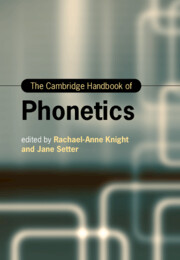Book contents
- The Cambridge Handbook of Phonetics
- Cambridge Handbooks in Language and Linguistics
- The Cambridge Handbook of Phonetics
- Copyright page
- Contents
- Figures
- Tables
- Contributors
- Introduction
- Section I Segmental Production
- Section II Prosodic Production
- Section III Measuring Speech
- Section IV Audition and Perception
- Section V Applications of Phonetics
- Index
- References
Introduction
Published online by Cambridge University Press: 11 November 2021
- The Cambridge Handbook of Phonetics
- Cambridge Handbooks in Language and Linguistics
- The Cambridge Handbook of Phonetics
- Copyright page
- Contents
- Figures
- Tables
- Contributors
- Introduction
- Section I Segmental Production
- Section II Prosodic Production
- Section III Measuring Speech
- Section IV Audition and Perception
- Section V Applications of Phonetics
- Index
- References
Summary
How is speech produced, perceived and processed? How is it used by individuals and speech communities, and how does it change over time? How is speech learnt, by first- and second-language speakers, and how does it present when it is disordered? These questions, alongside many more, are of interest to researchers in the broad field of phonetics. Phonetics has a long history, dating at least from writing systems in the ancient world, and has continually evolved as a discipline in response to new theories, methods and technologies (see, for example, Heselwood et al., 2013, for a full historical overview). Today, the field is broad, and interdisciplinary, as shown by the coverage of phonetics journals and conferences, and the chapters in this handbook.
- Type
- Chapter
- Information
- The Cambridge Handbook of Phonetics , pp. 1 - 8Publisher: Cambridge University PressPrint publication year: 2021

